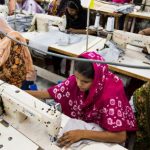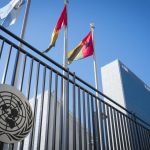
By Lisa Sachs, Lise Johnson, Kaitlin Cordes, Jesse Coleman, Brooke Guven
September 6, 2019
Two-thirds of the world’s population, 5.1 billion people, lack meaningful access to justice. In many cases, injustices are frequently caused or perpetuated by business activity. Despite international obligations for states and corporations, as applicable, to provide appropriate and effective remedies, injustice persists. The Business and Human Rights Arbitration Working Group, a group of respected practicing lawyers and academics, is advancing The Hague Rules on Business and Human Rights Arbitration (the “BHR Arbitration Rules”) to help address the remedy gap. This blog discusses concerns about the draft BHR Arbitration Rules that could result in them undermining, rather than advancing, access to justice of human rights claimants.

By Solina Kennedy
September 2, 2019
In this interview, the first of the Climate Crisis, Global Land Use and Human Rights series, Annie Signorelli, Project Manager for Renewable Energy and Human Rights at the Business and Human Rights Resource Centre (BHRRC), discusses the critical need for embedding human rights, especially those of indigenous communities, within the renewable energy sector, and the hurdles faced in pursuing environmental justice without compromising human rights.

By Sam Szoke-Burke and Kaitlin Y. Cordes
August 30, 2019
High global demand for land and natural resources has made protection of community lands and natural resources an urgent priority, particularly in countries with little or no legal protection for community land rights. Increased and smarter financing is urgently needed to meet affected communities’ justice and support needs.

By Nathan Lobel
August 20, 2019
The climate crisis will reshape our relationships to land around the world. Journalist David Wallace-Wells warns that, once the planet warms 2°C above preindustrial levels — the target set by the Paris Agreement — “major cities in the equatorial band of the planet will become unlivable,” and 400 million more people will suffer from regional water scarcity. At 3°C of warming — the expected result of Paris Agreement policy pledges by 2100 — world agriculture systems could struggle to meet global caloric demand and droughts are projected to plague much of India and Pakistan, the Mediterranean, Central America, the western United States, and Australia. At 4°C, closer to where current policies will lead us by the century’s close, rising seas could swallow land currently occupied by 470 to 760 million people.
By Cynthia Sanborn and Weijun Xie
February 21 – March 9, 2019
Cynthia Sanborn, of the Universidad del Pacífico in Lima, Peru, recently interviewed Weijun Xie, Vice President of China Minmetals Rare Earth Co., Ltd, and a fellow member of the Executive Session on the Politics of Extractive Industries, about the rising prominence of Chinese companies in the world extractive industry. Their conversation addresses the larger political concerns for Chinese investors as they enter into an investment world historically dominated by European and American companies. It also addresses the on-the-ground political challenges of effective communication, transparency and consultation that affect all extractive industry investments, but particularly new and growing enterprises such as those coming out of China.

By Nicola Woodroffe, Perrine Toledano and Jeff Geipel
August 14, 2019
Extractive projects can generate substantial revenues for host countries, and discoveries often bring hopes of jobs, development and newfound wealth. But they also generate a range of negative environmental and social effects, which can have direct and significant economic implications. At the Extractive Industries Transparency Initiative (EITI) global conference in Paris, the Natural Resource Governance Institute (NRGI), the Columbia Center on Sustainable Investment (CCSI) and the Mining Shared Value (MSV) initiative of Engineers Without Borders held an event that delved into how we can better measure, value and report on the non-fiscal impacts of extraction, alongside fiscal impacts.

By Paolo Natali, Suzanne Greene, and Perrine Toledano
August 14, 2019
The embedded carbon content of any product is largely unknown to the final consumer. Very few consumers are aware of the carbon that has been generated in the production and delivery of products and, as a consequence, virtually nobody takes action to abate these emissions. The MIT Sustainable Supply Chains initiative, Columbia Center for Sustainable Investment, and Rocky Mountain Institute’s Materials initiative have formed a working group to engage minerals producers, end users, investors, and other stakeholders interested in carbon accounting.

By Rumbidzai Maweni
July 10, 2019
In June 2019, the Business and Human Rights Arbitration Working Group, a private group of international lawyers and academics, published the Draft Arbitration Rules on Business and Human Rights, an initiative which proposes to create an international private judicial dispute resolution avenue for parties involved in business and human rights disputes. This post reviews the proposal in light of recent attempts to address business and human rights in the context of international arbitration with a specific focus on the Bangladesh Accord arbitrations.

In this alumni profile, Mary Ndaro, Coordinator for Ardhi Yetu program at CARE International, Tanzania, and a 2017 Executive Training alumnus, addresses women’s land rights, capacity building for civil society organizations, and grassroots engagement around land policies and investments.

By Lise Johnson
May 3, 2019
From April 1-5, 2019, 106 governments met under the auspices of the United Nations Commission on International Trade Law (UNCITRAL) in New York to discuss how to reform the controversial system of investor-state dispute settlement (ISDS) presently embedded in thousands of international investment treaties. Intergovernmental organizations, development banks, and dozens of other organizations from around the world participated as official observers. This blog discusses five key takeaways.












